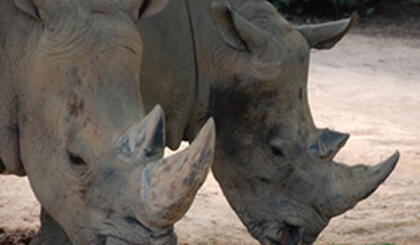ICCWC delivers specialized training for wildlife law enforcement officers. Increased collaboration between African and Asian countries encouraged.
The International Consortium on Combating Wildlife Crime (ICCWC) delivered a two-day cutting-edge training workshop to wildlife law enforcement officials from 21 countries in Nairobi, Kenya, from 30 to 31 October 2013. The training strengthened the skills of law enforcement officers from across Africa and Asia, to combat transnational organized wildlife crime more effectively through the use of a broad range of innovative and specialized investigation techniques. It further exposed these officers to hands on training on the use of tools
ICCWC deploys a Wildlife Incident Support Team (WIST) to Sri Lanka
In response to the need to take new approaches to combat the illegal trade more effectively, the International Consortium on Combatting Wildlife Crime (ICCWC), at the request of Sri Lanka, deployed its first Wildlife Incident Support Teams (WIST). The WIST was aimed at collecting DNA samples from 359 elephant tusks that were seized by Sri Lanka Customs authorities in the port of Colombo and was in response to a Decision adopted by the Conference of the Parties to CITES at
ICCWC launches report of the First Global Meeting of the Wildlife Enforcement Networks and prepares strategy for continued support
The International Consortium on Combating Wildlife Crime (ICCWC) convened the world's Wildlife Enforcement Networks for the first time in the margins of the Conference of the Parties to the Convention on International Trade in Endangered Species of Wild Fauna and Flora (CITES) in March 2013 in Bangkok, Thailand. The First Global Meeting of the Wildlife Enforcement Networks (WENs), which brought together 131 participants from around the world, enabled wildlife law enforcement officers and WEN representatives to share their experiences at
ICCWC delivers specialized training for law enforcement officers
Cutting-edge training in investigation techniques has been delivered to wildlife law enforcement officials across Asia, helping them in their battle to halt transnational organized wildlife and forest crime. Over the past few years, there have been a number of successful seizures and arrests of wildlife traffickers at airports, seaports and border crossings in Asia, Africa and other regions of the world. These typically result from risk analysis or actionable intelligence of an individual traveling with illegal wildlife such as ivory
Wildlife crime consortium to host high-level events on transnational organized wildlife crime at CITES Conference
Wildlife and forest crime is increasingly organised and is demanding a more determined and coordinated enforcement response. The International Consortium on Combating Wildlife Crime (ICCWC) will host two major events at the Queen Sirikit National Convention Center (QSNCC) at the 16th meeting of the Conference of the Parties to CITES to be held from 3 to 14 March in Bangkok, Thailand. ICCWC will convene a roundtable on combating transnational organized wildlife and forest crime for Ministers and high-level representatives, to
Opening remarks by John E. Scanlon, CITES Secretary-General
Bangkok, Thailand, 14 February, 2012 Executive Director of INTERPOL's Police Service Leaders of the Customs and Police authorities of the tiger range States Representatives of the Host Country Colleagues from the International Consortium on Combating Wildlife Crime Distinguished participants " Our collective enforcement efforts to fight tiger crime must not just result in seizures - they must result in prosecutions, convictions and strong penalties to stop the flow of contraband. If we get the entire enforcement system right for the
Controlled deliveries: a tool for reaching the big players in illegal wildlife trafficking
A group photo of the participants to the workshop (click to enlarge) Organized by the World Customs Organization (WCO), under the auspices of the International Consortium on Combating Wildlife Crime (ICCWC), the first international workshop on Establishing a Network of Controlled Delivery Units for Forest and Wildlife Law Enforcement ended on 9 December, after three days of deliberation. Controlled deliveries have long been a tool for investigating drug and tobacco smuggling but their use in wildlife smuggling is more recent
CITES Secretary-General welcomes Resolution of the United Nations Commission on Crime Prevention and Criminal Justice on illicit trafficking in endangered species of wild fauna and flora
During its meeting in Vienna, from 11-15 April 2011, the United Nations’ Commission on Crime Prevention and Criminal Justice adopted a Resolution on “Crime prevention and criminal justice responses against illicit trafficking in endangered species of wild fauna and flora” which was proposed by Chile, Costa Rica, Guatemala, Mexico and the Philippines. Organized criminal networks are known to be involved in the poaching of rhinoceroses, as one example of illicit trafficking in endangered species. The Resolution ( full text attached)
ICCWC begins its work
ICCWC begins its work The Senior Experts Group of the International Consortium on Combating Wildlife Crime (ICCWC) met last week at the United Nations Office on Drugs and Crime (UNODC) in Vienna, Austria. Opened by Mr Yury Fedotov, Executive Director of UNODC, the meeting provided an opportunity for specialized staff of the five partner agencies to plan ICCWC activities in the short and mid-term. Experts agreed to develop a comprehensive programme of work. This programme will exploit the expertise of
Putting Saint Petersburg into practice
Putting Saint Petersburg into practice Geneva, 13 December 2010 Within days of the International Tiger Forum, held in Saint Petersburg, the Russian Federation, from 21 to 24 November 2010 ( http://www.tigersummit.ru/eng/index ), tiger range States are demonstrating their commitment to combating illegal trade in tigers and working with the international community. During the Forum, leaders of tiger range States adopted the Global Tiger Recovery Programme and Saint Petersburg Declaration where they acknowledged that enforcement must be a priority and urged
Pagination
Filter by
Clear filters








